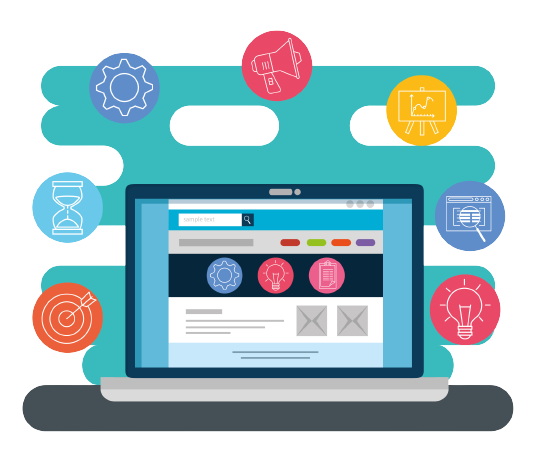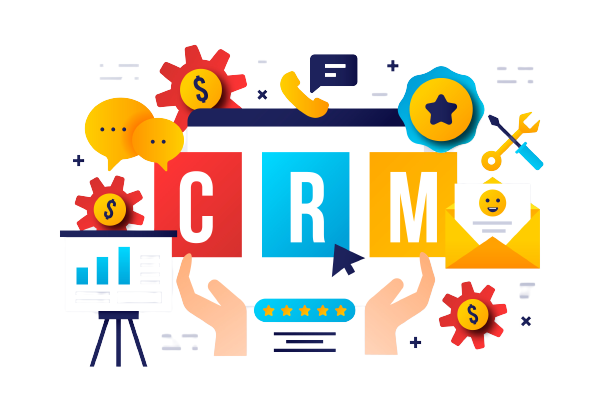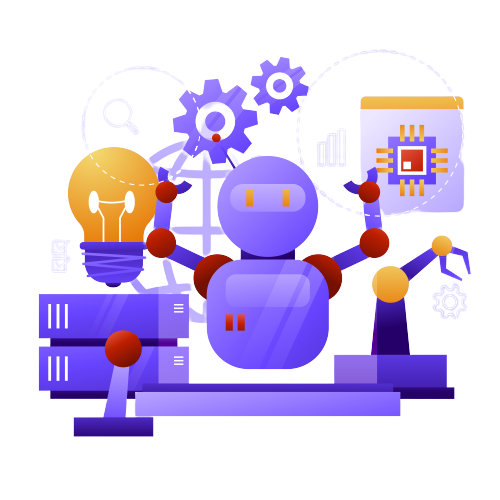
In the business world, nurturing strong customer relationships is a key ingredient for long-term success. That’s where CRM platforms for small businesses step in to lend a helping hand. These tools are like trusty companions, specially designed to make managing and fostering customer connections a breeze. To truly appreciate what CRM systems can do for your small business, it’s important to get cozy with the different features they bring to the table.
Imagine a CRM platform as the heart of your customer interactions, a place where you can neatly store, organize, and understand everything about your customers. It’s not just about names and numbers; it’s about the rich tapestry of interactions, purchase histories, and the shared stories that make your customers unique. This information allows you to provide top-notch service and that personal touch that sets your business apart.
- Contact Management: Think of contact management as the friendly address book you’ve always wanted. It’s where you keep your customer’s details – their names, phone numbers, emails, and more. But it’s not just a list; it’s a dynamic database that helps you remember and build on each customer interaction.
- Lead Tracking: This feature is like having your own personal assistant. It helps you keep tabs on potential customers, from the moment they express interest to when they become paying customers. No more missed opportunities or fumbled follow-ups; CRM keeps you on your toes and ensures you’re always one step ahead.
- Sales and Marketing Automation: Imagine having a trusty sidekick that handles repetitive tasks, like sending out emails and tracking your sales progress. CRM’s automation features are there to save you time and help you stay consistent in your customer interactions. It’s all about making your life easier and your marketing and sales strategies more effective.
- Reporting and Analytics Tools: The insights you get from CRM platform are like a compass for your business journey. It helps you see where you’ve been, where you are, and where you could go. With reporting and analytics, you can make well-informed decisions, tweak your strategies, and celebrate your victories, big or small.
- Integration Capabilities: CRM knows the value of teamwork. It easily connects with your other essential tools – your email marketing software, accounting system, and more. This means your data flows smoothly, you cut down on manual work, and your business operates like a well-oiled machine.
- Customer Support and Training Options: Everyone needs a helping hand from time to time. CRM providers understand this and offer you not only support but also training resources. They’re your coaches and cheerleaders, there to guide you in using the platform to its fullest.
Understanding the features of a CRM platform is like getting to know a trusted friend. It’s about building a relationship with a tool that helps you improve your customer connections and take your business to new heights. Your CRM platform becomes your go-to companion for enhancing efficiency and making your business flourish. It’s all about strengthening that bond between you and your customers. Let’s discuss these features in detail!
Customization and Scalability in CRM Platform Features

Customization and scalability are two critical aspects of CRM (Customer Relationship Management) platforms that every small business owner should thoroughly understand. These features play a pivotal role in tailoring the CRM system to meet your unique business needs and ensuring it can grow alongside your company’s expansion. Let’s get into the details of these essential elements:
Customization:
- Tailoring for Your Business Needs: CRM platforms offer various levels of customization, allowing you to configure the system to align with your specific business processes and requirements. This means you can adapt the CRM to cater to your industry, products, and services.
- Data Fields and Workflows: Customization often involves adding, editing, or removing data fields to record information that is relevant to your business. You can create custom fields to capture data unique to your operations. Additionally, you can design workflows that reflect your sales, marketing, and customer service processes.
- Branding and User Interface: Many CRM systems allow you to incorporate your company’s branding elements, such as logos, colors, and themes, into the user interface. This not only makes the CRM more visually appealing but also reinforces your brand identity.
- Permission and Access Control: Customization extends to user access and permissions. You can define roles and privileges for different team members to ensure they only access the data and functionalities relevant to their job responsibilities.
Scalability:
- Growing with Your Business: Scalability refers to the CRM platform’s ability to accommodate the growth of your business. A CRM that is scalable can handle an increasing volume of data, users, and customer interactions as your company expands.
- Adding Users: As your team grows, a scalable CRM should allow you to easily add new users without compromising system performance. You should be able to set up user accounts and provide access to the CRM’s features without much hassle.
- Data Handling: A scalable CRM should efficiently manage larger datasets without experiencing performance issues. This ensures that as your customer database grows, the CRM remains responsive and capable of delivering real-time insights.
- Integration with Third-party Tools: Scalability also extends to integrating the CRM with other software tools, such as email marketing platforms, e-commerce systems, or accounting software. A scalable CRM should support these integrations, ensuring that your systems can work seamlessly together as your business evolves.
- Upgrades and Maintenance: A scalable CRM platform should offer easy and seamless updates to accommodate new features, bug fixes, and security enhancements. This way, your CRM stays current and adaptable to changing business needs.
Thus, customization and scalability are pivotal aspects of CRM platform features that allow small businesses to personalize their CRM system to match their unique needs and ensure that it can grow in tandem with the business’s expansion. When selecting a CRM platform, it’s essential to consider these features to create a system that not only addresses your immediate requirements but also supports your long-term success.
Contact Management and Lead Tracking for Small Businesses

Contact management and lead tracking are pivotal features of CRM platforms, especially for small businesses aiming to foster meaningful customer relationships and boost sales. Let’s get deeper into the details of how these features can benefit your business.
Contact Management:
Effective contact management is at the core of every CRM platform. It allows you to store and organize your customer information in one centralized location. Here’s how this feature can benefit your small business:
- Centralized Database: A CRM system acts as a single repository for all your customer data, including contact details, communication history, purchase history, and interactions. This eliminates the need to shuffle through spreadsheets, emails, or physical files to find information, saving you time and effort.
- Segmentation and Targeting: With a CRM, you can categorize your contacts into different segments based on various criteria, such as demographics, behavior, or purchase history. This segmentation enables you to send targeted and relevant marketing campaigns, improving your chances of conversion.
- Communication History: You can keep track of all interactions with your contacts, including emails, phone calls, and meetings. This ensures that your team has a complete history of your relationship with each contact, allowing for more personalized and meaningful conversations.
- Task and Follow-up Management: Most CRM platforms offer task management features. This allows you to set reminders for follow-up calls or emails, ensuring that you don’t miss out on potential opportunities.
Lead Tracking:

Lead tracking is an essential feature for businesses looking to convert prospects into paying customers. Here’s how it can be advantageous for your small business:
- Lead Capture: CRM systems enable you to capture leads from various sources, such as your website, social media, or trade shows. This feature ensures that no potential lead slips through the cracks.
- Lead Scoring: Lead tracking often includes lead scoring, which assigns values to leads based on their behavior and characteristics. This helps your sales team prioritize their efforts, focusing on the most promising prospects.
- Lead Nurturing: CRM platforms offer tools for lead nurturing, including automated email sequences and personalized content. These features help guide leads through the sales funnel, building trust and rapport with your brand.
- Real-time Lead Updates: CRM systems provide real-time updates on lead activity. This means you’ll be notified when a lead opens an email or visits your website, allowing your sales team to engage with them when they’re most interested.
- Conversion Analysis: You can track the progress of leads through your sales pipeline, identifying bottlenecks and optimizing your sales process for better conversion rates.
Thus, contact management and lead tracking are indispensable CRM features for small businesses. They simplify customer data management, enhance communication, and enable you to convert leads into loyal customers. By harnessing the power of these features, you can streamline your sales and marketing efforts, ultimately driving growth and success for your business.
Sales and Marketing Automation

Sales and marketing automation is a crucial feature of CRM platforms that can significantly benefit small business owners. This feature streamlines and simplifies your sales and marketing processes, allowing you to focus on what matters most: growing your business and building strong customer relationships.
- Lead Management: CRM systems with sales and marketing automation capabilities provide a central hub for managing your leads. You can capture leads from various sources, such as your website, social media, or email campaigns. These systems can also segment your leads based on various criteria, making it easier to target the right audience with personalized messages.
- Lead Nurturing: Once you’ve captured leads, the automation feature allows you to set up lead nurturing campaigns. You can create automated email sequences that deliver relevant content to leads over time. This helps build and maintain engagement until leads are ready to convert into customers.
- Email Marketing: Sales and marketing automation within CRM platforms often include email marketing tools. You can design and send professional-looking emails, track their performance, and even automate follow-up emails based on recipient behavior. This not only saves time but also ensures your communications are timely and relevant.
- Workflow Automation: Workflow automation is a powerful feature that can be customized to your specific business processes. You can set up automation rules to trigger actions based on customer interactions. For example, when a lead reaches a certain score or performs a particular action, the system can automatically assign the lead to a sales representative for follow-up.
- Lead Scoring: Many CRM systems offer lead scoring, which helps you prioritize your leads. Leads are assigned scores based on their interactions with your business. High-scoring leads are more likely to convert, so your sales team can focus on them, while low-scoring leads can be nurtured until they are more sales-ready.
- Sales Pipeline Management: Sales automation features within CRM platforms assist in managing your sales pipeline. You can create, customize, and visualize your sales stages. The system can automatically move leads through the pipeline as they progress, giving you a clear overview of your sales process.
- Marketing Analytics: CRM platforms often include robust analytics and reporting tools. With these, you can track the performance of your marketing campaigns, lead conversions, and sales processes. This data is invaluable for making informed decisions and optimizing your strategies.
- Integration with Marketing Tools: Many CRM systems offer integration with third-party marketing tools, such as social media management platforms or marketing automation software. This ensures that your CRM is seamlessly connected to your broader marketing efforts.
- Marketing ROI Tracking: Effective CRM platforms allow you to measure the return on investment (ROI) of your marketing efforts. You can see which campaigns are driving the most revenue and adjust your marketing strategies accordingly.
Sales and marketing automation features in CRM platforms can save small business owners time and money, increase efficiency, and improve customer interactions. When utilized effectively, these features can lead to more targeted and successful marketing campaigns, better lead management, and ultimately, increased sales and revenue.
Reporting and Analytics Tools
The ability to gather, analyze, and interpret data has become paramount. CRM platforms offer a wealth of reporting and analytics tools that can empower small business owners with actionable insights. Let’s delve into this aspect of CRM in more detail.
- Data Visualization:
Many CRM platforms provide easy-to-use, interactive dashboards and data visualization tools. These features allow small business owners to transform complex data into visually comprehensible charts and graphs. With just a few clicks, you can gain insights into your sales, marketing, and customer engagement metrics. The ability to visualize data is especially valuable for identifying trends, patterns, and outliers, making it easier to make informed decisions.
- Custom Reports:
Small businesses have unique needs and metrics that matter most to them. CRM systems allow users to create custom reports tailored to their specific requirements. Whether you want to track customer acquisition costs, monitor sales team performance, or evaluate the success of marketing campaigns, you can design reports that provide the exact data you need. This flexibility is invaluable for adapting to changing business dynamics.
- Forecasting and Predictive Analytics:
One of the most exciting aspects of CRM reporting and analytics is the ability to forecast future trends. By analyzing historical data, CRM systems can generate predictions about future sales, customer behavior, and market demand. Small business owners can use these insights to make strategic decisions, plan inventory, and allocate resources more effectively.
- Lead Scoring and Customer Segmentation:
CRM reporting tools can also help you assess the quality of leads and segment your customer base. Lead scoring assigns values to leads based on their likelihood to convert, allowing your sales team to prioritize their efforts. Customer segmentation categorizes your customers into groups based on their characteristics and behaviors, enabling targeted marketing and personalized engagement strategies.
- Performance Tracking:
Whether you’re monitoring individual employee performance or evaluating the effectiveness of your marketing campaigns, CRM reporting and analytics tools make it easy to track key performance indicators (KPIs). You can gauge the success of your business initiatives, identify areas that need improvement, and adjust your strategies accordingly.
- Real-time Data:
In today’s fast-paced business environment, having access to real-time data is a game-changer. Many CRM platforms offer real-time reporting, ensuring you always have the latest information at your fingertips. This is particularly valuable for addressing customer inquiries, identifying opportunities, and reacting swiftly to market changes.
- ROI Analysis:
Determining the return on investment (ROI) of various business activities is crucial for small business owners. CRM reporting tools can help you assess the profitability of marketing campaigns, customer acquisition channels, and other investments. By quantifying the impact of your strategies, you can allocate your budget wisely.
These features empower you with the ability to make data-driven decisions, adapt to changing market conditions, and optimize your operations. By harnessing the power of data, you can drive growth and success in your small business.
Integration Capabilities in CRM Platforms for Small Businesses

Integration capabilities are a crucial aspect of any CRM platform, especially for small businesses. In today’s digital age, where numerous tools and software applications are used to streamline various business processes, the ability to integrate your CRM with these applications is essential. Let’s dive into the importance and benefits of integration capabilities in CRM platforms for small business owners.
- Streamlined Data Management:
One of the primary benefits of integration capabilities is streamlined data management. Small businesses often use multiple software tools for various functions, such as accounting, email marketing, e-commerce, and customer support. Integrating your CRM system with these tools ensures that data flows seamlessly between them. This means that when a customer places an order on your e-commerce website, that information is automatically updated in your CRM system, saving you time and reducing the risk of data entry errors.
- Improved Customer Insights:
Integration capabilities enable you to gather comprehensive customer data from various touchpoints and consolidate it within your CRM. This results in a 360-degree view of your customers, which can help you better understand their behavior and preferences. For example, if a customer interacts with your email marketing campaigns and then makes a purchase on your website, your CRM can track these interactions and provide insights into the effectiveness of your marketing efforts.
- Enhanced Marketing and Sales Efforts:
Integrating your CRM with marketing automation tools allows for more personalized and targeted marketing campaigns. You can create automated workflows that send follow-up emails, trigger notifications to your sales team, or segment your customer base based on their interactions and preferences. This level of personalization can significantly boost your conversion rates and customer retention.
- Efficient Communication:
Integration capabilities also facilitate efficient communication within your organization. For instance, integrating your CRM with your email and calendar software ensures that your sales and support teams have easy access to customer information and can schedule appointments or follow-ups without leaving the CRM platform. This minimizes the risk of miscommunication and helps in providing a better customer experience.
- Inventory Management:
For businesses that deal with physical products, integrating your CRM with inventory management software is essential. This ensures that your sales team can access real-time information about product availability and manage orders more effectively. It also prevents over-selling and under-stocking issues that can harm your reputation and bottom line.
- Customer Support and Issue Resolution:
Integrating CRM with customer support systems can help streamline issue resolution. Customer service representatives can access a customer’s purchase history, inquiries, and complaints, allowing them to provide quicker and more personalized support. This leads to higher customer satisfaction and improved customer loyalty.
- Cost and Time Savings:
Ultimately, integration capabilities can save small businesses time and money. Manual data entry and the need to switch between multiple applications can be time-consuming and prone to errors. Integration automates many processes, reducing the likelihood of mistakes and allowing your team to focus on more strategic tasks.
When selecting a CRM platform for your small business, consider the integration capabilities it offers to ensure that it aligns with your business needs and goals.
Wrapping Up!
Choosing the right free CRM software for your small business involves considering a range of features, from customization and automation to integration capabilities. Additionally, evaluating the available customer support and training options is crucial for your long-term success in managing customer relationships effectively.